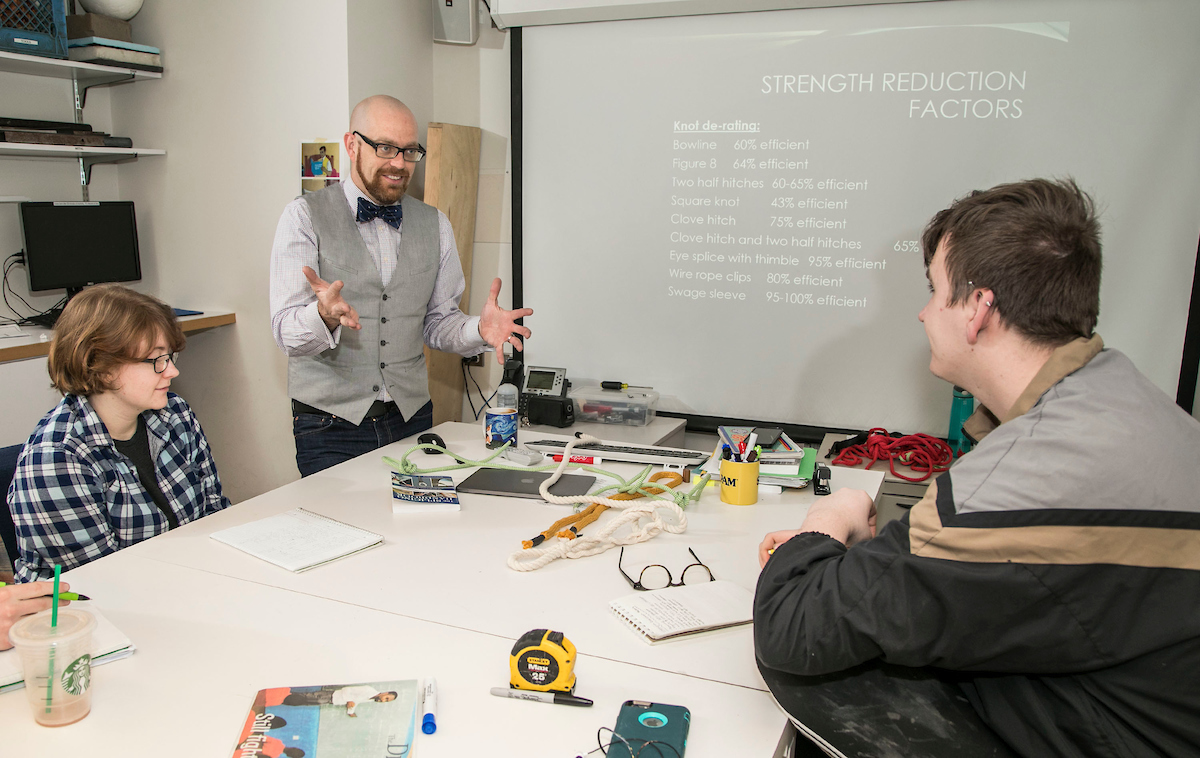 Shane Kelly (center), head of Theatre Technology and the chair of Design and Technology, discusses proper stage rigging with students, one of the many aspects of theatre design and technology. (DePaul University/Jamie Moncrief)
Shane Kelly (center), head of Theatre Technology and the chair of Design and Technology, discusses proper stage rigging with students, one of the many aspects of theatre design and technology. (DePaul University/Jamie Moncrief)
After working on productions that range from The Second City to the NBA All-Star Jam Session, Shane Kelly now teaches and advises as the head of theatre technology and the chair of design and technology at The Theatre School. He and playwright, Kristin Idaszak, recently began their own Chicago theatre company, Cloudgate Theatre. Read on to learn how Kelly's career inspires him to teach his students the importance of creativity, collaboration and the role theatre technicians play beyond the set.
Describe your specific responsibilities. Are there any misconceptions about your job?
As the head of theatre technology, I'm the full-time faculty member and advisor for all of the theatre technology students. I also teach classes on theatre technology, construction and rigging, technical drawing, and production management. Students learn to create what theatre designers imagine, using the proper systems, tools and materials. As the chair of design and technology, I collaborate with other Theatre School faculty to ensure we train our students, produce quality shows and support each other's goals.
Some people ask me, 'How many shows have you acted in this year?' While yes, I work in theatre, theatre technology is a much different role. I enjoy explaining my job because there are many more people backstage - working in the shops and production areas - to produce a show than you ever see on stage.
How has theatre technology changed since you began?
Designers and directors use many more tools to create what they're imagining. For example, we have an automated rigging system in The Theatre School building. While those systems existed 20 years ago, they were really rough. Technical directors and theatre technicians do an extensive amount of work on computers: we're drawing, making calculations, and sometimes programming automated systems if there's a stage lift or tracking unit in the show.
What's unique about The Theatre School and its theatre technology program?
Chicago is a huge theatre city, and our location alone provides many opportunities and experiences other schools can't access. Many of DePaul's shows are produced by an entirely undergraduate crew, including the directors, designers, the technical director and the dramaturg. Faculty members may advise, but undergraduate students really produce these shows. Undergraduate students at other universities may have fewer design-technology-specific opportunities than they would have here because there are also graduate students studying in the same program.
What career experiences have influenced your teaching the most?
Almost everything I do on a professional level comes back to the classroom in some way. When I was first out of graduate school, I worked at the American Repertory Theatre in Boston. That theatre is known for doing experimental and bold productions, and it was a formative experience for me to work in an organizations where they never said 'no.' That's something I try to impress upon my students - figuring out how they can work with the creative team to reach their goals in new ways.
What is the most important thing for your students to learn?
I want my students to not only learn how to build platforms, weld scenery, draft things and create budgets, but also learn how to be great human beings. Students will continue to learn new skills throughout their careers. There's no way I can ever teach anybody everything. If I can set people up to be good collaborators and effective managers who care for their coworkers, that's where success starts.
How do your other projects influence your work at DePaul or vice versa?
Every day, I challenge my students and myself to look at what's problematic in theatre and how we can contribute to making the industry better. That may be making sure we have the equipment, tools and awareness to make sets accessible to anyone with mobility concerns, or empowering students to address negative issues within the entertainment industry.
I also want my students to work in inclusive environments and help tell stories from many perspectives. It is vital that they support work written by a people of color, women, trans and gender non-conforming artists. Making sure my students are exposed to diverse voices and different ways of storytelling is important so they can make informed choices on what shows they produce. It also speaks to our value systems a theatre-makers and as human beings. All of that matters for technicians just as much as anyone else on set.
As theatre technicians, we all have the skillset to do other things like draft for architectural firms or build houses. We choose to use our skills for theatre and entertainment instead because we're excited about what it can do for the world.